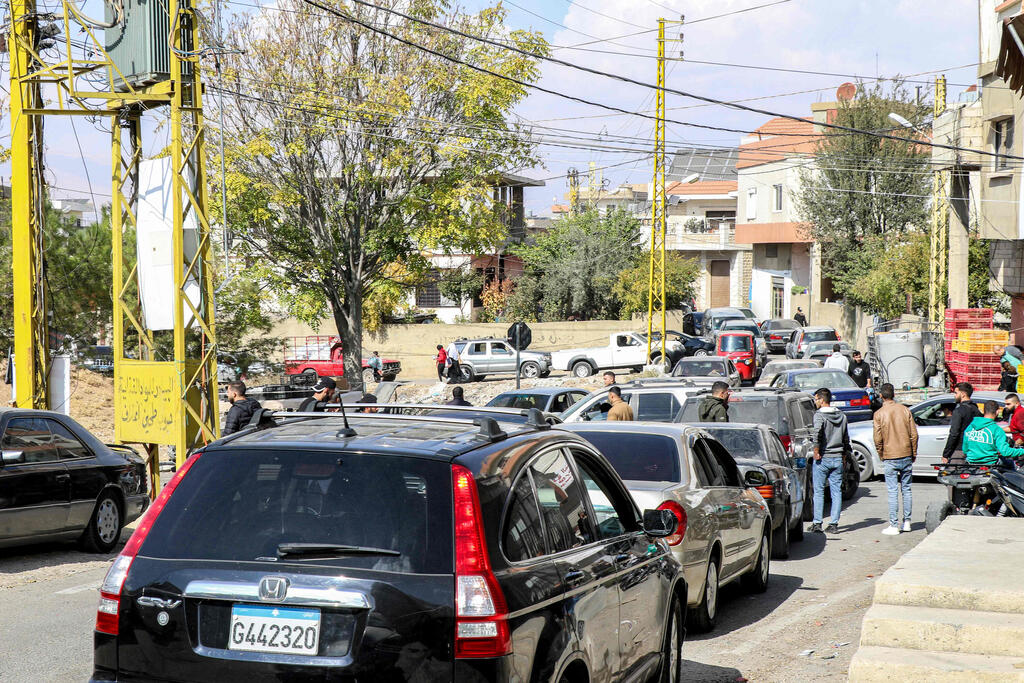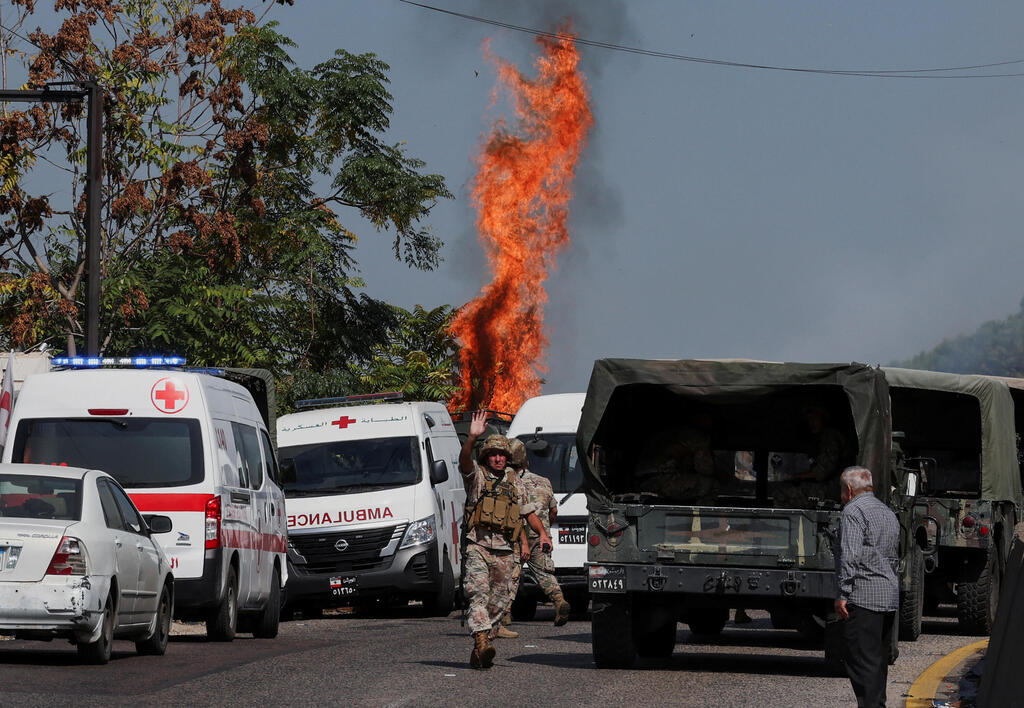Getting your Trinity Audio player ready...
Huge explosions and large amounts of smoke were seen and heard in the Lebanese town of Baalbek on Wednesday afternoon. The attacks in Baalbek came during the maiden speech by new Hezbollah chief Naim Qassem, as news channels in Lebanon switched from the speech to the attacks.
The attacks followed an evacuation warning issued to residents of Baalbek, Ain Borday and Dours in eastern Lebanon by the IDF's Arabic spokesperson, Lt. Col. Avichay Adraee, prompting a massive exodus.
The warning came after two farmers sustained injuries, ranging from mild to moderate-severe, on Wednesday morning due to a direct rocket strike launched from Lebanon targeting Metula.
IAF strikes in southern Lebanon
Adraee's message stated: "Urgent notice to the residents of Baalbek, Ain Borday, and Dours. IDF is taking strong action against Hezbollah interests in your towns and villages and does not wish to harm you. To ensure your safety, you must immediately evacuate your homes and move beyond the towns and villages via the following routes: Zahle-Baalbek Road; Nahla-Baalbek Road; Al-Arz-Baalbek Road, as outlined on the map. Proximity to Hezbollah operatives, its facilities, or weaponry may expose you to danger."
Following the evacuation announcement, Sky News in Arabic reported on the mass departures from the Baalbek area and other regions identified in Adraee's notice. The governor of Baalbek said in an interview with Sky News in Arabic that "there is no military presence of Hezbollah" within Baalbek and urged residents to head toward the northern district, adding that "panic has spread among the residents after the evacuation warnings."
Fuel depots attacked in Baalbek
In the afternoon, IDF spokesperson reported that Air Force fighter jets, guided by intelligence from Military Intelligence, the Air Force, and Northern Command, attacked the Nabatieh area and eliminated Mostafa Ahmed Shhadi, the deputy commander of Hezbollah's Radwan Force. In his former roles, he was responsible for operations in Radwan during the Syrian conflict from 2012 to 2017 and managed the unit's combat plans in southern Lebanon.
"Mustafa Ahmad Shihadi advanced terror plots against the State of Israel. This elimination further cripples the operational capabilities of Hezbollah's Radwan Force to execute terror activities against Israeli forces and the Israeli home front on the northern border, particularly the plan to conquer the Galilee," the report stated.
Meanwhile, the Lebanese "Al-Mayadeen" network, affiliated with Hezbollah, reported an aerial strike on a vehicle on the Al-Kahhala Araya road in the Mount Lebanon area. According to the Lebanese "Al-Jadid" channel, one person was killed in the vehicle attack. Minutes earlier, a separate report in Lebanon detailed another vehicle attack using a drone in the nearby village of Shamoun.
Earlier in the morning, minor damage was reported at a factory building in Nahariya, where aviation components are manufactured, after a drone exploded nearby. The IDF is investigating why no alert was triggered at the site.
Prior to this, IDF spokesperson updated that the Air Force intercepted three drones that penetrated from Lebanon after sirens activated in Nahariya and communities in the western Galilee. It was further reported that there were no casualties in the incident, although a fire broke out near the Gesher HaZiv area.
In the meantime, the Jewish National Fund (KKL) released data on Wednesday indicating the extent of damage caused by Hezbollah fire since the war began. Approximately 43,243 acres of natural land were burned in the Upper Galilee-Golan Heights region, which suffered the most damage. They estimate that rehabilitation will take between five to seven years.
In the Lower Galilee-Gilboa, slightly more than 6,100 acres of open and forested areas were burned, according to KKL data. In the Western Galilee-Carmel region, approximately 2,224 acres were burned, and in the Hula Valley, approximately 178 acres.
"KKL emergency teams, alongside firefighting and rescue crews, continue to lead the fight against fires in the north, even under fire," said KKL Chairperson Yifat Ovadia-Luski. "The war has caused severe damage to the residents of the north, and unfortunately also to wildlife and vegetation. Our primary mission for the new year is to rejuvenate the affected areas and the entire State of Israel."
KKL also noted that the fires impacted a wide variety of wildlife: many bird nesting sites were destroyed, habitats of mammals and reptiles living on the ground were burned, and a large number of arthropods could not escape the flames.
The damage to vegetation, they noted, is severe. All forest and woodland trees, including conifers like pine, cypress, and cedar, as well as broadleaf trees such as oak, terebinth, Judas tree, eucalyptus, carob, and almond, were affected by the fires. Additionally, public spaces like parking lots, lookout points, scenic viewpoints, forest entrances, and scenic routes were also burned.
'They want to make a "lame" agreement'
Northern municipal leaders addressed the potential settlement in the north, as revealed on Tuesday by Ynet and "Yedioth Ahronoth." Eitan Davidi, chairman of Moshav Margaliot, said: "We want the war to end, but this is not the way. Israel is attempting to reach an agreement that would allow residents in southern Lebanon to return to their homes, and at some point, we could live amicably with our neighbors, but that's not the situation."
He stated, "This neighborhood doesn't work, the concept doesn't work. The State of Israel needs to change its approach." Davidi warned that if such a settlement is implemented, "we will protest." He added: "I suggest to the Chief of Staff and the Northern Command Commander to focus on restoring security and achieving results within Lebanon. They want to make a 'lame' agreement."
Shimon Guetta, head of the Ma'ale Yosef Regional Council, said in an interview with Ynet: "We need to end this once and for all. We are eager to return to our homes, but to return safely. The residents will not return easily. People have been outside their homes for a year."
Get the Ynetnews app on your smartphone:






